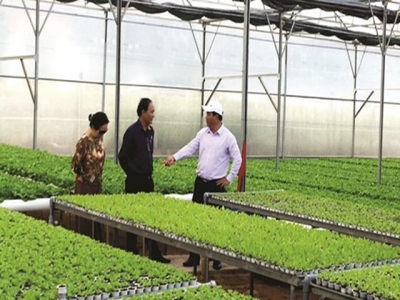Authorities seek ways to promote VietGap vegetables

Cooperatives growing VietGap (Vietnamese Good Agricultural Practices) vegetables need to build customer trust first before expanding cultivation areas, experts have said. Photo sggp
Ho Chi Minh City – Cooperatives involved in growing VietGap (Vietnamese Good Agricultural Practices) vegetables should first build trust with consumers and producers before expanding cultivation, experts have said.
Availabe land to grow vegetables under VietGap standards is abudnant, but many co-operatives only use 50-60 per cent of land because of a lack of buyers, according to a report from the HCM City Department of Industry and Trade.
Nguyễn Thành Công, director of Susu Công Thành Co-Operative in Lâm Đồng Province, said that his co-operative has a 42ha area for vegetables under VietGap standards, with 13 members and 207 households.
The co-operative supplies four to seven tonnes of vegetables of 56 kinds to three wholesale markets in HCM City daily.
However, in recent years, total output from the cooperatives to HCM City has dropped by 60 – 70 percent.
Nguyễn Nguyên Phương, a representative of HCM City’s Department of Industry and Trade, said that a lack of trust and linkages between consumers and producers was the main reason.
“Customers find it difficult to check the farms and cooperatives producing clean vegetables,” he said.
To improve food safety, HCM City authorities are seeking ways to trace agricultural produce sold through both modern and traditional retail channels.
By the end of this year, the city aims to have all goods sold via modern distribution channels meet VietGap standards, have proper packaging, and be traceable through mobile phones, according to the Department of Industry and Trade.
Since January of last year, the city has been experimenting with various ways to improve produce traceability..
Củ Chi District’s Phú Lộc Agricultural Co-Operative has, for instance, been using QR code stamps, which allow customers to see the entire farming and transportation process.
The Department of Agriculture and Rural Development has been organising training classes for farmers and providing them with equipment to upload data about product origins.
In addition, Bình Chánh Province’s Phước An Agricultural Co-Operative noted that the reputation of its products improved after they began affixing QR stamps.
However, Phú Lộc Cooperative lacks skilled and meticulous supervisors, and the restocking of stamps is costly as well.
In addition, data entry is inefficient, with officials having to meet each farmer to collect data, while traceable produce is not a priority for many retailers and distributors.
The most traditional markets, which account for most of the food distributed in the country, sell goods whose origins are not traceable and do not keep records or receipts.
Many farmers are still struggling to enter data using modern technology, and unstable internet connections in remote areas slow down uploading of data.
A key solution to boost consumption of farm produce would be to increase connections among producers and distributors.
The city has held activities to promote farmers’ products to consumers through trade fairs, workshops and promotions both inside and outside the country.
Better linkages between farmers and businesses will also help both producers and distributors reduce losses, and prevent a big drop in prices due to abundant supply, according to experts.
Related news
 Pepper of Lâm San Agricultural Cooperative meets EU organic standards
Pepper of Lâm San Agricultural Cooperative meets EU organic standards Organic standards in European countries are granted to agricultural products that do not use toxic chemicals. There are strict limitations
 New decree to help organic agriculture
New decree to help organic agriculture Vietnam is one of 170 countries producing organic agricultural products. Organic and green agriculture has become a trend worldwide.
 Retailers come to aid of Bình Thuận farmers
Retailers come to aid of Bình Thuận farmers Several supermarkets in HCM City are planning to help dragon fruit farmers in the central province of Bình Thuận sell their products at better than market price